
Upon receiving the Rising Star award at the 2022 BAFTA Film Awards last night (March. 13), No Time To Die actor Lashana Lynch didn’t stutter: this moment was unequivocally about a dark-skinned Black actor celebrating a “yes” — or rather, as fellow rising star honouree Bukky Bakray said as she handed over the accolade, this is “queen tings.”
Poised and glistening, the Hammersmith actor devoted her speech to her strong foundations; from the friends who remind her of her power “and how to stand in it” as well as the Black-British talent who taught her “what it is to be in this industry as a dark-skinned woman.” As her mother cheered her on from the celebrity-strong audience, Lynch also spoke of her grandparents came to the UK from Jamaica during the Windrush generation, telling the audience “I have them to thank for my existence.”
More pointedly, Lynch took the moment to address how her upbringing helped prepare her for her career. The Captain Marvel actor said: “I’m grateful for a working class foundation that taught me everything I needed to know about failure, about nos, about what nos mean and how to celebrate your yeses. Now, I get to celebrate a yes I never expected.”
Watching this memorable BAFTA moment as a Black British woman from a similar background, Lashana Lynch’s win was more like a “hell yes” for those who have watched the actress quite literally do what was previously thought impossible. The 34-year-old is widely acknowledged for her career-defining performance in No Time To Die, where she famously portrayed M16’s first Black and female 007, Nomi, in the iconic spy film. The role undoubtedly shook (and stirred) up the franchise, all the while centuring a Black woman as just as skillful, and capable as the James Bond franchise’s white male hero.
Well before her BAFTA acknowledgement, Lynch has always stressed that the Bond role was a win that went beyond just herself. As she told Yrsa Daley-Ward in an interview with Harper’s Bazaar, “I didn’t want to waste an opportunity when it came to what Nomi might represent. I searched for at least one moment in the script where Black audience members would nod their heads, tutting at the reality but glad to see their real life represented.” Lynch did that — and the British film academy were more than right to celebrate as such.
For me, and many others watching, Lynch’s words on BAFTA night felt like a call to action: when was the last time I celebrated my wins as much as I lamented about disappointment and failure?
For me, and many others watching on, Lynch’s words on BAFTA night felt like a call to action: when was the last time I celebrated my wins as much as I lamented about disappointment and failure? Failure and “nos” can become an extrinsic part of the success story when attempting to break into spaces where you’re not always eagerly accepted or widely represented. So much so, it’s easy to consider your “wins” as fleeting no matter how great they are. Think back to 2021, when Lynch’s “redefining” role as 007 was accused of “virtue signalling” and she received indignation from online trolls, but, as she said to the LA Times, “I don’t have anything to say to the trolls apart from it’s none of my business what you think, you have the freedom to live in your truth just like I have the freedom to live in mine.”
Reflecting on this, I’m also reminded of Serena Williams’ Trophy Room, filmed in a home tour for Architectural Digest, where she keeps a shrine of all of her record-smashing tennis trophies (and jokingly throws second-place medals in the “trash”, FYI), and can’t help but thinking how similarly we should keep our wins on display (literally or otherwise) because how can we expect anybody to celebrate us, if we don’t celebrate ourselves? In many ways, the journey to breaking boundaries is always littered with nos, Lynch speech reminds us why, when we do secure a sweet, sweet yes, we should always take the moment to drink it all in.
Like what you see? How about some more R29 goodness, right here?
Actually, The Future Of 007 Can Be A Black Woman